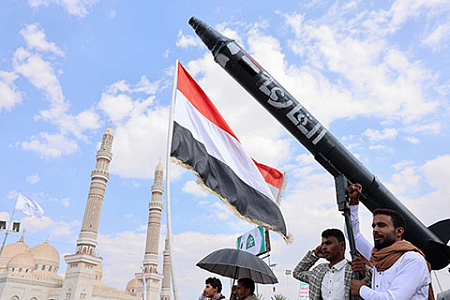
Yemen’s Houthi movement, Ansar Allah, has dramatically escalated regional tensions by declaring major American energy corporations as hostile entities, effectively placing them on a target list. In a move that shatters a fragile, unannounced truce with the United States, the group warned that companies like ExxonMobil and Chevron could face attacks if their assets operate near the Arabian Peninsula. This declaration marks a significant uptick in hostilities, which the Houthis have consistently linked to their opposition to the ongoing war in Gaza, and comes as the Trump administration attempts to broker a ceasefire in that conflict.
The official notice was issued by the Houthi-run Humanitarian Operations Coordination Center (HOCC), which oversees the group’s policies regarding international maritime routes. The body accused 13 American companies and nine individuals of violating a Houthi-imposed ban on oil exports to the United States, stating it would use “all available means and tools to counter any hostile measures” against Yemen. This statement serves as a direct threat, signaling an end to the informal “quiet period” that had been in place since May.
That de-escalation agreement, brokered by Oman, saw both U.S. and Houthi officials agree to refrain from mutual attacks. According to Oman’s Foreign Minister Badr al-Busaidi at the time, the understanding was meant to “ensure freedom of navigation and remove obstacles to international trade” in the critical Red Sea and Bab el-Mandeb strait. The Houthis’ new posture effectively nullifies this arrangement, reopening the prospect of direct confrontation between the Iran-aligned group and U.S. forces.
Underscoring their continued operational capacity, the Houthis have also intensified attacks on other international vessels. The group claimed responsibility for a recent missile strike on the Dutch-flagged cargo ship Minervagracht in the Gulf of Aden. A Houthi military spokesperson claimed the vessel’s owner had violated a “ban on entry into the ports of occupied Palestine,” adding that the direct hit caused a fire and put the ship at risk of sinking.
Direct conflict with Israel, a primary adversary for the Houthis in their stated solidarity with Hamas, also continues to simmer. A Houthi drone attack on the Israeli city of Eilat on September 24 evaded interception and injured nearly 20 people upon impact. Israel responded with retaliatory airstrikes on Yemen’s capital, Sanaa, which reportedly resulted in at least nine fatalities. The exchange prompted UN Secretary-General António Guterres to express grave concern over the risk of further regional escalation and remind all parties of their obligation to protect civilians.
Amid these developments, the Houthi leadership is reportedly bolstering its internal security protocols. Citing intelligence sources, reports suggest the group is taking measures to protect its top figures from potential Israeli espionage, fearing a scenario similar to operations conducted inside Iran where infiltrated agents have allegedly aided in targeted strikes. This indicates a growing paranoia within the movement as it braces for potential decapitation strikes.
The Houthis’ renewed aggression coincides with Washington’s diplomatic push for a resolution in Gaza. However, a parallel concern is growing in the region: that any stabilization in Gaza could lead Israel to pivot its focus toward Iran and its nuclear program. Israel remains deeply unsettled by Tehran’s stockpile of highly enriched uranium and suspects the existence of undeclared nuclear sites. In a sign that the U.S. is preparing for multiple contingencies, Bloomberg reported that the Pentagon is set to award a $123 million contract to Boeing to replenish its stock of GBU-57 “bunker-buster” bombs, the same type of ordnance used against Iran’s underground nuclear facilities in June, signaling that military options remain firmly on the table.
